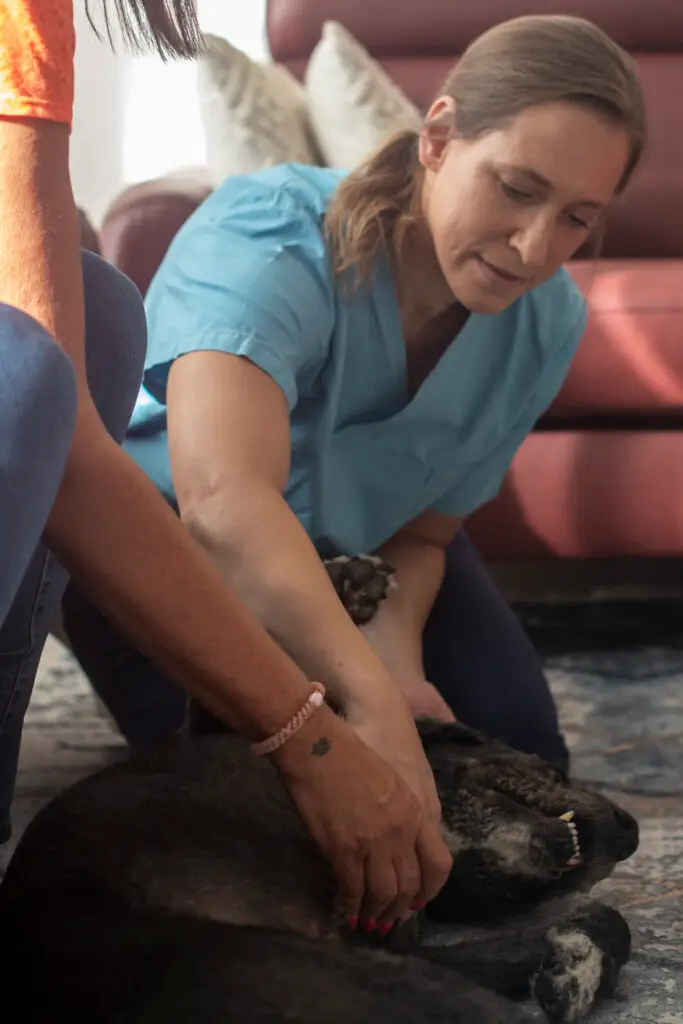
Veterinarian
for your dog
As a mobile veterinarian, I treat your dog in its own trusted environment, within the comfort of your home. This can be a huge advantage, especially for dogs who are already afraid of the veterinary clinic or for whom meeting other dogs in a clinic waiting room is stressful. An examination in their familiar surroundings is also wonderful for senior dogs who are no longer able to walk well.
FAQs on dog health
Does my dog require a kennel cough vaccine?
Kennel cough is caused by a variety of viruses and bacteria (often in combination with each other). It is not possible to vaccinate against all of these pathogens. Generally, all dogs are vaccinated against canine adenovirus and parainfluenza virus. In addition, a nasal vaccination or oral vaccination can be given, which also protects against the Bordetella bronchiseptica bacterium.
Whether the additional nasal/oral vaccination against kennel cough is recommended for your dog depends on his/her living conditions and individual risk factors (e.g. dog sports, puppy playgroup, doggy daycare or boarding facilities).
I'm happy to advise you on your dog's individual situation. Contact me anytime.
When should my dog see a veterinarian?
An annual health check makes sense for all dogs. Other reasons for a visit to the vet include a reduced or absent appetite, vomiting, diarrhea or constipation, as well as signs of pain or discomfort. Behavioral changes such as sleeping more often, withdrawing, or sudden aggressive behavior towards people and other dogs are often due to health issues, as well. Contact me if you'd like to discuss your dog's symptoms. I'm happy to advise.
My dog's behaviour is suddenly changing. What does this mean?
Behavioral changes such as more frequent sleeping, withdrawal, new fears or sudden aggressive behavior towards people and other dogs often have their origin in health problems. Contact me if you'd like to discuss your dog's symptoms. I'm happy to advise.
Does a tick bite require a vet visit?
If you find a tick on your dog, you should remove it as soon as possible (more information on this here). You can then disinfect the area with a disinfectant (e.g. diluted Betadine, Octenisept). Usually, no follow-up treatment is required. Even stuck parasite parts can normally be removed by the body itself over the course of a few days.
The transmission of diseases from ticks to dogs is possible, however. If you notice fever or other symptoms in your dog, contact me right away.
My dog is suddenly drinking lots. What should I do?
Polydypsia (increased drinking) can be a symptom of many diseases (e.g. diabetes, kidney disease, thyroid disease). It is advisable to have the dog checked by a vet. In the time leading up to the planned vet appointment, you should ideally make a note of the exact amount your dog drinks.
My dog has diarrhoea. What should I do?
Acute diarrhea (1-3 days, without further symptoms, with normal appetite and normal general condition) can be observed for the time being and, if necessary, supported with a probiotic. Also remember to deworm regularly.
If the diarrhea lasts longer or your dog is showing other symptoms such as vomiting, apathy or loss of appetite, a vet visit should be planned as soon as possible. Contact me if required.
My senior dog is panting frequently. What does this mean?
Increased panting can be a sign of pain or also indicate diseases of the respiratory tract or heart. A veterinary examination should be carried out promptly.
What are the symptoms of dementia in dogs?
Cognitive dysfunction (colloquially known as dementia) in dogs often manifests itself in changes in temperament, e.g. confusion, anxiety, aimless wandering, “staring into space”, withdrawal, or altered behavior towards people or other animals in the household. Affected dogs are often unable to rest at night, keeping their owners awake. They may forget to eat, or defecate or urinate in the house.
Dementia in dogs cannot be cured, but its progression can be slowed, and the symptoms can often be controlled with good management to the extent that living with your dog becomes more enjoyable again. We look at these topics in a geriatric consult.
Can senior dogs suffer from arthritis?
Yes, one in five dogs will be diagnosed with osteoarthritis during the course of their lives. Owners usually first notice a change in gait or reduced muscle tone and unwillingness to move.
The earlier the treatment of osteoarthritis begins, the better quality of life your dog will have and the longer the progression of the disease can be halted. Nowadays there are many options for multimodal pain therapy. However, the most important measures are often in the management and adaptation of the dog's environment. So make an early appointment for a geriatric consult - see Geriatric medicine.
How do you know when it's time to euthanize your dog?
Unfortunately, there is no general answer to this question. It is often assumed that the dog must be doing well enough if it is still eating. However, this is definitely not the case for all dogs. In addition, the time of euthanasia is a very individual decision and can be dependent on many factors. I'm happy to advise you in your particular situation.
